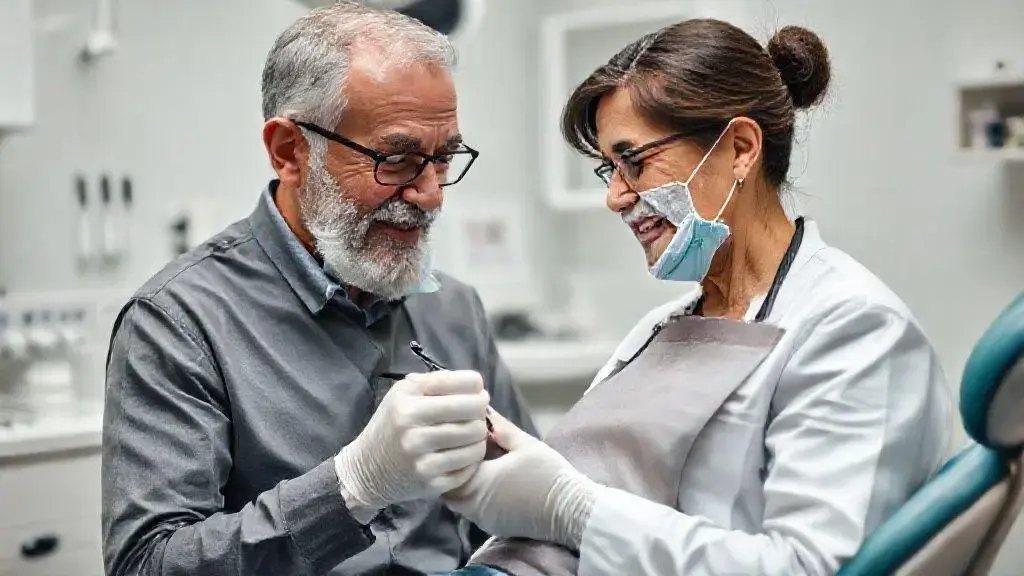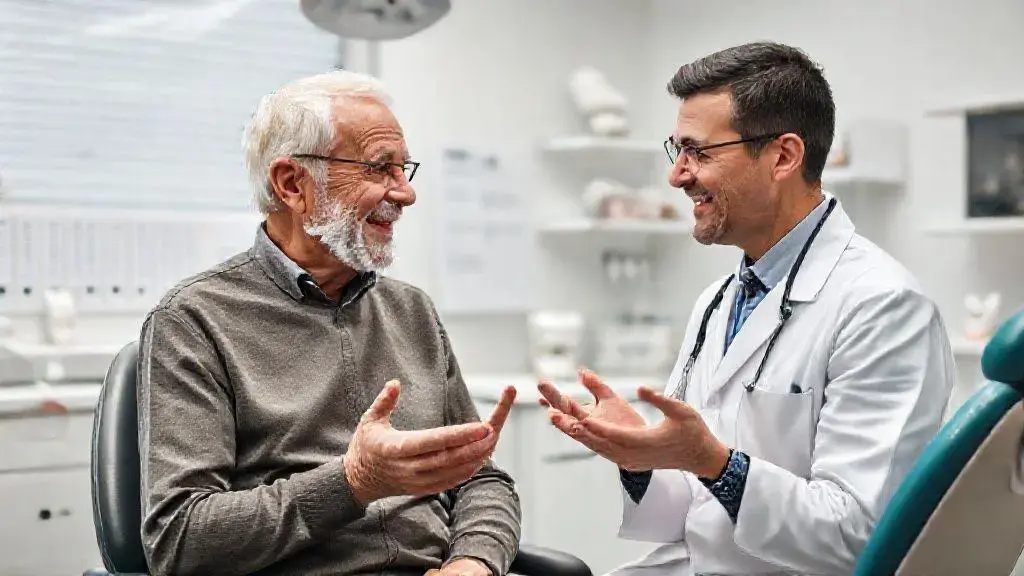Dental care benefits expanded for low-income seniors

Dental care benefits expanded for low-income seniors include access to affordable services through community health centers, government assistance programs, and preventive measures like regular checkups and good oral hygiene practices.
Dental care benefits expanded for low-income seniors play a vital role in maintaining their health and well-being. Have you considered how access to proper dental care can significantly improve quality of life? Let’s dive deeper into this important topic.
Understanding the importance of dental care
Understanding the importance of dental care is essential for everyone, especially seniors. Oral health dramatically impacts overall well-being. Many low-income seniors face challenges accessing proper dental services, which can lead to more serious health issues.
Regular dental visits help prevent problems like tooth decay and gum disease. These issues can cause pain, affect nutrition, and lower the quality of life.
Benefits of Regular Dental Visits
Regular visits to the dentist provide various benefits, including:
- Prevention: Catching issues early can save time and money.
- Education: Dentists provide valuable information on how to maintain good oral hygiene.
- Customized Treatment: Each individual has unique needs that a dentist can address.
By prioritizing dental health, seniors can enjoy a better quality of life. Good oral hygiene practices at home are equally important. Brushing twice a day and flossing daily can help maintain a healthy mouth.
Common Barriers to Dental Care
Many low-income seniors experience barriers to dental care. These can include:
- Cost: Dental procedures can be expensive, discouraging visits.
- Lack of Transportation: Access to transportation can limit their ability to attend appointments.
- Health Issues: Certain health conditions may make dental visits challenging.
Understanding these barriers allows us to find solutions to improve access. Community resources often exist to assist these seniors in overcoming such challenges.
Financial assistance programs available
Many low-income seniors need support for their dental care, and thankfully, financial assistance programs are available. These programs can help alleviate the burden of dental expenses, allowing more seniors to access the services they need.
Various organizations offer programs designed specifically for seniors. Some of these programs include Medicare, which covers certain dental services, and Medicaid, providing more comprehensive coverage for low-income individuals.
Types of Financial Assistance
Seniors can explore several types of financial assistance options:
- Government Programs: Local and federal government initiatives often provide funding for dental care.
- Nonprofit Organizations: Many nonprofits focus on improving oral health for seniors, offering free or reduced-cost services.
- Sliding Scale Clinics: Some dental clinics adjust their fees based on the patient’s income, making care more affordable.
By understanding the resources available, seniors can find the necessary support to ensure their dental health is prioritized. It’s essential to research local programs and speak with healthcare providers to identify options that fit individual needs.
In addition to these resources, seniors can also benefit from community outreach programs focused on education and prevention. These initiatives often provide free screenings and dental workshops to help seniors maintain good oral hygiene.
Applying for Assistance
The process for applying for financial assistance might seem overwhelming, but it can be straightforward. Many organizations offer help with the application process. It’s important to gather necessary documentation, such as income verification and proof of residency, to facilitate the application.
Connecting with local community health centers can provide valuable information and guidance on navigating the options available. These centers often serve as hubs for resources aimed at improving seniors’ health outcomes.
Common dental issues faced by seniors

Seniors often face unique challenges when it comes to their dental health. Understanding the common issues they encounter can help in finding the right care and solutions. As people age, their risk for certain oral health problems increases, which can affect overall well-being.
Some prevalent dental issues among seniors include tooth decay, gum disease, and oral cancer. Regular dental checkups are essential for identifying these problems early.
Tooth Decay
Tooth decay is not just a childhood problem. Seniors can experience decay due to dry mouth, medications, and improper dental care routines. Maintaining a good oral hygiene routine is key to preventing this issue. Remember to:
- Brush teeth twice a day: Use fluoride toothpaste.
- Floss daily: Keep spaces between the teeth clean.
- Stay hydrated: Drink plenty of water.
Tooth decay often leads to pain and further complications, making prevention vital.
Gum Disease
Gum disease is another significant concern for seniors. It can lead to infections and tooth loss if not addressed. Symptoms include redness, swelling, and bleeding gums. Regular cleanings by a dentist can help keep gums healthy.
Having a proper diet also contributes to gum health. Foods rich in vitamins and minerals support oral tissues, which can reduce the risk of gum disease.
Oral Cancer
Oral cancer can affect anyone, but seniors are at a higher risk. Early detection is crucial for successful treatment. Regular screenings at dental visits can help identify early signs. Seniors should be aware of symptoms such as:
- Unexplained lumps: Any growth in the mouth should be examined.
- Persistent pain: Ongoing discomfort can indicate a problem.
- Changes in swallowing: Difficulty swallowing may signal issues.
By keeping an eye on these common dental issues, seniors can take proactive steps to maintain their oral health.
Preventive measures for better oral health
Preventive measures for better oral health are essential, especially for seniors. By taking proactive steps, older adults can significantly reduce the risk of dental problems. Simple daily habits can lead to lasting benefits.
Maintaining good oral hygiene is a critical component. This includes brushing teeth at least twice a day with fluoride toothpaste. Flossing daily is equally important, as it helps remove food particles and plaque from areas where a toothbrush cannot reach.
Regular Dental Checkups
Scheduling regular dental checkups is vital for seniors. During these visits, dentists can identify potential issues before they become serious. Regular cleanings remove tartar buildup and help keep gums healthy. Seniors should aim to visit the dentist at least twice a year.
Healthy Diet Choices
A balanced diet plays a significant role in oral health. Foods rich in vitamins and minerals can strengthen teeth and gums. Seniors should focus on:
- Calcium-rich foods: Dairy products, leafy greens, and fortified foods can support tooth strength.
- Vitamin C: Citrus fruits and vegetables like bell peppers are essential for gum health.
- Avoiding sugary snacks: Reducing sugar intake can help prevent cavities.
Staying hydrated is another critical factor. Drinking plenty of water helps maintain saliva flow, which naturally protects teeth from decay.
Practicing Good Habits
In addition to brushing and dietary choices, seniors should consider other preventive measures. Quitting smoking can greatly improve oral health, as tobacco products contribute to gum disease and oral cancer. Moreover, it’s essential to wear mouthguards when engaging in activities that could lead to dental injuries.
Being aware of oral health is crucial as seniors age. Keeping an eye out for changes in the mouth, such as soreness or sensitivity, can help detect problems early. By following these preventive measures, seniors can enjoy a healthier smile and better overall health.
Resources for accessing dental services
Accessing dental services can be challenging for low-income seniors, but there are valuable resources available to help. Understanding these resources empowers seniors to take control of their oral health and find the care they need.
First, community health centers offer a range of dental services at reduced costs. These centers often have staff who understand the financial constraints that many seniors face. They provide comprehensive care, including routine check-ups, cleanings, and more advanced dental treatments.
Government Assistance Programs
Another important resource is government assistance programs. Programs like Medicaid and Medicare can cover specific dental services for eligible seniors. While coverage varies by state, many states offer extensive dental benefits for low-income individuals. Seniors should check their eligibility and understand what services are covered.
Local Nonprofit Organizations
Numerous nonprofit organizations focus on improving dental care access for seniors. These organizations often run dental clinics that offer free or low-cost services. Examples include:
- Dental Lifeline Network: Provides free dental care to eligible seniors.
- Bring Smiles to Seniors: Offers free dental services and education.
- United Way: Connects seniors to local resources for affordable dental care.
Additionally, many universities have dental schools that provide services at reduced rates. Supervised dental students gain hands-on experience while offering affordable treatment options.
Telehealth Services
Telehealth services are also becoming more common in dentistry. Seniors can consult with dental professionals virtually to discuss their concerns and receive advice on oral health matters. This option can be particularly beneficial for those who have difficulty traveling to appointments.
Understanding available resources helps seniors access vital dental care. By leveraging these options, seniors can improve their oral health and overall quality of life. Whether through community health centers, government programs, or local nonprofits, support is available.
FAQ – Frequently Asked Questions about Dental Care for Seniors
What are the common dental issues faced by seniors?
Seniors often experience tooth decay, gum disease, and oral cancer due to various factors like aging and medication.
How can seniors access affordable dental services?
Seniors can utilize community health centers, government programs like Medicaid, and nonprofit organizations offering dental care.
What preventive measures can improve oral health?
Daily brushing and flossing, regular dental checkups, and a balanced diet are key practices that can enhance oral health.
Are there resources specifically for low-income seniors regarding dental care?
Yes, various resources like local nonprofits, dental schools, and government assistance programs are available to support low-income seniors.





